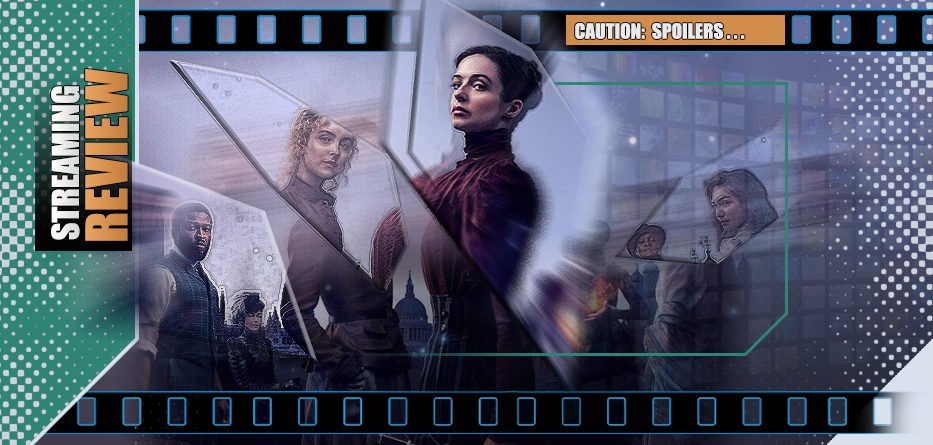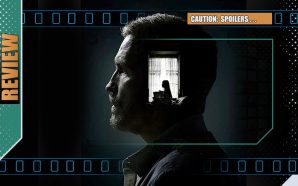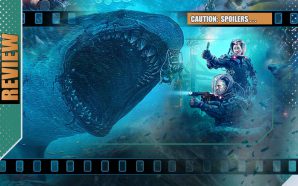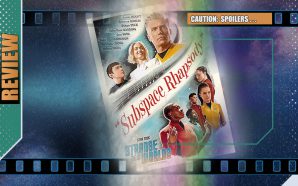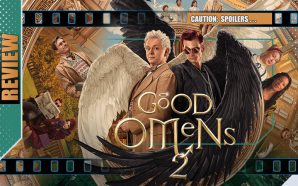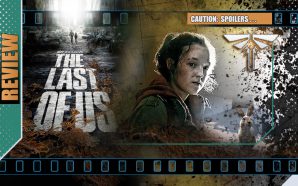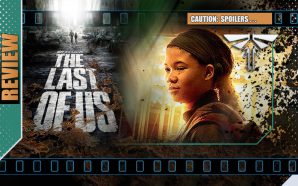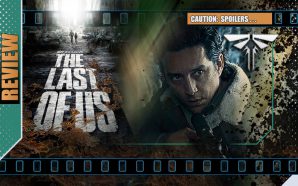If this overview was to appear under our ‘Why aren’t you watching..?‘ banner, then the universal chorus of replies would be: “…because the Powers that Be have made it nigh on impossible to do so!” And, as a statement of fact, it’s hard to refute. Because in two decades of covering film and television I’m hard-pushed to remember a time when some of a show’s episodes have been dangled as a soothing balm to fans but then been so far out of reach that one wonders why they were offered at all. Some shows get cancelled, cut off never to be seen again. Sometimes remaining episodes get burned off over a quick few weeks in the summer or form ‘never seen before’ extras on a late DVD release. But in the case of The Nevers, what should have been an epic television series for the ages, has been hobbled by an appalling halfway house of a solution proving the flimsiest of choices and one destined to be overlooked by the masses and simply irritate the faithful.
But in examining the ‘What not to do…‘ aspects that plagued The Nevers, one should start with a history lesson of trials and tribulations that started far earlier…
Way back in the Before Times, The Nevers was to be Joss Whedon’s grand return to weekly television. It was announced in 2018 that Whedon (the driving force behind Buffy the Vampire Slayer, Angel, Firefly etc and a fan of British productions, was heading across the Big Pond and turning his hand to an epic international production and vision that mixed his established niche ideas of outlier forces and female empowerment into a high-budget, ambitious series.
The official premise read: In the last years of Victoria’s reign, London is beset by the ‘Touched’: people — mostly women — who suddenly manifest abnormal abilities, some charming, some very disturbing. Among them are Amalia True (Laura Donnelly), a mysterious, quick-fisted widow, and Penance Adair (Ann Skelly), a brilliant young inventor. They are the champions of this new underclass, making a home for the Touched, while fighting the forces of… well, pretty much all the forces — to make room for those whom history as we know it has no place.
In short, think a steampunk’d X-Men. It was the equivalent of pop-culture catnip.
The HBO/SKY series went before the cameras in July 2019 and anticipation only grew. It continued lensing in locations around London and completed five of its announced ten episodes before it was shut down in early 2020 due to the spread of COVID. More filming was done later that year and it was announced that the rest of the season (now increased to twelve episodes in total) would be shot in 2021 with the broadcast of the show ultimately split into two sections of six episodes each. So far, so good.
But away from the set, Whedon’s career was dealt a major blow by a string of accusations about his behaviour on past productions. In 2017, Whedon’s ex-wife and collaborator Kai Cole had written a rather damning article that accused him of a string on infidelities on the set of his productions and behaviour that was at odds with his ‘female empowerment’ brand. A few months later, Whedon had taken over the reins on Justice League from Zack Snyder (after the latter suffered a family bereavement) and he radically altered the idea and story that would eventually be released. Actor Ray Fisher, who played Cyborg, made it known that after several run-ins with the director, his scenes were reduced, many being edited out of the film. He made a formal complaint about ‘gross, abusive, unprofessional, and completely unacceptable’ behaviour. What might have been put down to a personality-clash or ‘creative differences’ started steam-rolling when Fisher was backed up by the likes of Gal Gadot (playing Wonder Woman) who claimed that Whedon threatened to derail her career. (Whedon would later claim her accusations were down to English not being her first language, which likely didn’t help his cause). Rather than being intimidated, she went around him and it was Whedon who suffered more fall-out as an investigation was launched. Then details of his time back on Buffy made matters worse. Stunt-team Jeff Pruitt and Sophia Crawford had for years spoken about the way the working relationship with Whedon had deteriorated over their years on the show, but now some of the main cast were speaking out. Charisma Carpenter (who played Cordelia Chase) made claims of a ‘hostile and toxic working environment‘, that he was verbally abusive to her on the set of Angel and sacked her because she became pregnant. Later Sarah Michelle Gellar, Amber Benson and other prominent cast-members would openly support Carpenter’s stance. Whedon remained silent but would later claim in a 2022 interview that he was both the victim of a misinformation campaign but had also been ‘powerless’ to resist having affairs on set.
Shortly after a formal investigation into Fisher’s Justice League complaints by WarnerMedia (who made the film and also own HBO), Whedon announced he was withdrawing from The Nevers.
“This year of unprecedented challenges has impacted my life and perspective in ways I could never have imagined, and while developing and producing The Nevers has been a joyful experience, I realize that the level of commitment required moving forward, combined with the physical challenges of making such a huge show during a global pandemic, is more than I can handle without the work beginning to suffer,” Whedon said in an interview at the time with CinemaBlend.
HBO‘s statement was shorter: “We have parted ways with Joss Whedon. We remain excited about the future of The Nevers and look forward to its premiere in the summer of 2021.”
When the series actually made it to air in April 2021, Whedon’s name was contractually there on the credits but you’d be hard-pushed to find it anywhere on the marketing where it would once have been the most prominent selling-point.
Reviews of the episodes were pretty good. The cast, led by Donnelly and Skelly, were a strong ensemble that also included a raft of familiar faces giving it their all, including Ben Chaplin, James Norton, Pip Torrens and Tom Riley. The show faced a lot of competition with a raft of even higher-budgeted shows debuting on various platforms around the same time, but it’s interesting mythology enticed viewers and, arguably, the off-screen controversies may have raised its profile. Certainly, the concept attracted a niche audience, the VFX were solid and the characters intriguing… and it seemed like what had been destined to be a major-release was still considered a decent series and a good start Six episodes were broadcast… (we reviewed them here) and then everything went quiet.
During the restructuring of 2022 WarnerMedia (now WarnerDiscovery… and the subject of which probably warrants its own book never mind an article), the company began to cut a swathe through projects it felt were not going to be profitable for its share-holders. Even fully-completed productions like Batgirl were pulled before release and many a current tv series was cancelled or not renewed. The DC universe was suddenly realigned under new management and it was generally considered that any show that wasn’t a bonafide high-flyer (and even some that were) were likely in trouble. Shows like Westworld were not only not renewed but had their entire back-catalogue of episodes pulled from streaming in what is generally believed to be down to a radical tax write-off. On December 12 2022, HBO formally announced that The Nevers would be not be getting a second series and would also be pulled from its library. It was now impossible to see the show legitimately and it was not immediately clear what would happen to the remaining six unseen episodes. It would be a month later when fans got the good news/bad news.
And here we are: The good news was that the episodes would be broadcast on free-to-air streaming service Tubi in February 2023. The bad news? That the entire season would be broadcast over three days, including the original six and the remaining six. They would be broadcast ‘live’ during the weekday afternoons of the 14th, 15th and 16th February with no immediate repeats or time-delay access….and in the same format again over three days in March. They would not be available for download or DVR purposes. In short, the only way to see The Nevers and its conclusion would be to take three days off work and pencil in those afternoons for a blink-and-you’ll-miss-it delivery. Fans were not pleased and even grizzled television pundits were baffled by the strategy. It was almost impossible to find a worse solution.
So what of those final six episodes?
Thanks to a colleague I was able to see them en masse a few days before they apparently leaked onto torrenting sites (and though we formally stand against pirating, one has to suggest that The Powers That Be have basically made that option far more enticing to frustrated fans because of the Tubi scheduling).
There had been whispers that this back-end of the season was a total train-wreck and may have contributed to the screening strategy. That description would be far too damning, there’s certainly worse things to watch if you make the effort to do so. But there’s little doubt that the remaining episodes, though picking up where we left off, do feel somehow adrift from the original. It doesn’t help that those attempting to catch-up had little chance to refresh their memories of some of the specifics and where we’d left the characters (though it’s hard to forget the hand-brake screech into science-fiction future war scenario that cast Claudia Black as the character who’d eventually travel back and possess the body of True Adair… and which ultimately felt like a totally different show. (To be fair, Whedon had done something similar with another of his old shows, flash-forwarding in Dollhouse). But even if we hadn’t known of new writers and a new show-runner being involved, there’s simply a telling change of emphasis here, a distinct feeling of the original vision being acknowledged and respected but then tweaked or even redirected. All the main characters are here, but the focus feels just slightly off, as if someone else is finishing another’s work or working from notes. (What, if any, narrative changes were actually made is debatable, but it’s more a subtle change of emphasis with characters moving to the fore and behaving differently when they’d been very much supportive players up until that point).
Amalia and Penance (True/ O’Daire… geddit?) are still the two women attempting to make sense of everything – and sometimes at odds with each other – but they’re more divided than united and for huge chunks. True is kept away from the ‘Orphanage’ to the point that she’s seen as something of an absentee landlord and almost abandoning her friends. (It’s not quite that simple, but this back-order does seem to want to point out all of True’s flaws and her dubious ‘means to an end’ by keeping her at arm’s length from her associates). Amy Manson’s Maladie remains a highlight – as is often the case when an actor/character is allowed to chew the scenery with manic glee, but she brings more of a humanity than we’d seen so far. Ben Chaplin is almost unrecognisable as the grizzled and troubled detective Frank Mundi and James Norton loves swanning around as the decadent Hugo Swan. Olivia Williams’ wheelchair-bound Lavinia Bidlow ( a touch of the ‘Xavier’?) had previously proved something of an enigma, seemingly playing both sides of the equation as a benefactor for the Orphanage yet actively working against ‘Touched’ interests. The new episodes make her actively an opponent, though there’s still subterfuge and family machinations that keep her interesting… though developments often feel rushed. Her brother Augie (Tom Riley) was the seemingly sweet, innocent and bumbling type but these episodes make his past and intentions darker as well (and I can’t have been the only one thinking of how Whedon changed ‘Wesley’ between Buffy and Angel into someone much more tormented).
The bigger climax and resolution of the main story are a bit confusing. There’s dying aliens being captured, recaptured, dying, surviving and exploding and ghosts in the machine determined to hijack the signals… all jumbled together and a variety of agendas that seem a little made up as they go along. The familiar aspects of bigotry and self-serving agendas are there, but the far more nuanced politicking in Carnival Row, makes The Nevers board-room machinations seem somewhat petty. There are significant deaths in the final episode – to the extent that one wondered if there’s be a reset button or get-out-clause before the end, but the casualty count perhaps suggests that the show’s future was always in doubt and any further stories would have changed many of the supporting cast. If the show had returned, it would have been interesting to see how its core mission-statement would have been changed. (One wonders if any thought had been given to trimming the finale’s final moments so that the ending was at least neater?).
I’m not sure, given its apathetic send-off whether The Nevers will be a show mourned with much hand-wringing or just another quickly forgotten entry that never quite made it. Watching the credits roll on the finale there’s a sense of disappointment – largely because there’s a sense of what was originally possible and the wasted potential… of a show that had all the right ingredients but was ultimately under-baked, half-baked or over-baked depending on how you want to take that analogy.
Tubi will broadcast the episodes again this week between 1st March – 3rd March. There are unconfirmed rumors about it appearing on the Roku App later in the year.
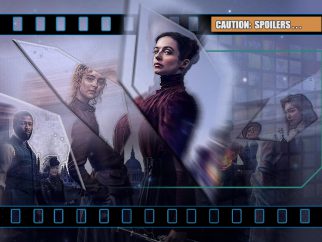
- Story7
- Acting8
- Direction8
- Production Design / VFX8

